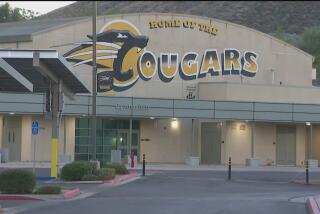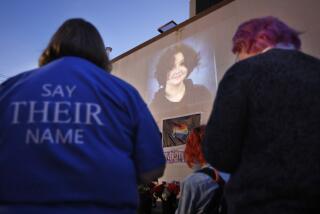Death of UC Riverside student raises question of fraternity hazing
Detectives are investigating the death of a 20-year-old UC Riverside student who collapsed during a fraternity outing to Mt. Rubidoux over the weekend and whether hazing was a factor.
Tyler Hilliard’s family said he had experienced hazing prior to his death as a pledge of Alpha Phi Alpha — a celebrated African American fraternity whose members include civic leaders Martin Luther King Jr. and Thurgood Marshall.
“I’m not saying that his death was a direct result of hazing. I don’t know that for sure,” Hilliard’s mother, Myeasha Kimble-Hilliard, said on Tuesday. “But I believe something happened that led up to his death.”
The incident in Riverside began about 9 p.m. Saturday at a popular hiking spot just west of the city’s downtown. Hilliard complained he was feeling short of breath and then collapsed as the group planned to go for a run. The fraternity’s pledge master called 911, Kimble-Hilliard said.
Hilliard’s family said they later discovered text messages on his phone referring to the Mt. Rubidoux trip as “gold paddle day.”
Kimble-Hilliard said she discovered through text messages that her son had been forced to eat an entire onion covered in hot sauce, forced to drink large amounts of water and was paddled with a piece of cactus as part of the fraternity’s pledge process, which began over the summer.
She said she took Hilliard to the emergency room several weeks ago after he complained of chest pain that he said came on after he ate the onion. He was prescribed medication for heartburn and tests at the hospital did not turn up anything unusual, Kimble-Hilliard said.
Riverside Police Officer Ryan Railsback said detectives are investigating whether hazing played a role in Hilliard’s death. Authorities have labeled his death as suspicious.
Hilliard’s body did not show any obvious signs of trauma. Authorities are waiting for an autopsy report that could reveal whether his death stemmed from an underlying medical issue, hazing or something else, Railsback said.
“It’s just not the easy whodunit type of case,” he said. “There’s a lot of unknowns about this.”
Investigators will be looking toward members of the fraternity for information.
“Historically, there’s an aspect of secrecy in fraternities,” Railsback said. “We would hope that would go out the door if something bad happened to a member. We would hope whoever is involved would come forward.”
The UC Riverside chapter of Alpha Phi Alpha could not be reached for comment. The national fraternity organization said Tuesday that it has launched an investigation in partnership with the university and placed the chapter on an “immediate cease and desist status,” which suspends all of its activities.
The fraternal organization has a strict prohibition on mental and physical hazing and trains new members on the rule. Any member who violates the anti-hazing policy faces suspension and expulsion from the organization, according to Alpha Phi Alpha officials.
UC Riverside also has a zero-tolerance policy for hazing, according to the university.
Hazing, which includes humiliating and sometimes dangerous initiation rituals, has been a part of Greek fraternity culture since its inception.
A 2008 University of Maine study concluded that 55% of students who join sororities, fraternities, sports teams or other groups on college campuses experience hazing. The majority of incidents go unreported.
Hank Nuwer, author of “Hazing: Destroying Young Lives,” who has studied the effects of hazing, said despite the risks associated with the activity, alumni are often present and encourage undergraduates when hazing occurs, which further reinforces the high-risk practice.
“That’s where we can’t seem to make any headway,” Nuwer said. “We can make them give up hard alcohol and place other stiff prohibitions on undergraduate members, but what can you do with alumni? They are often the ones who direct and instigate hazing incidents.”
At least one hazing death has occurred each year on a United States college campus from 1961 to 2017, according to data compiled by Nuwer.
“Do any risky activity long enough and eventually something deadly can happen,” he said. “It’s amazing that you see a ritual that has been repeated year after year until someone is hurt, gets caught or until a member turns on the group.”
Twitter: @Hannahnfry
More to Read
Start your day right
Sign up for Essential California for news, features and recommendations from the L.A. Times and beyond in your inbox six days a week.
You may occasionally receive promotional content from the Los Angeles Times.







